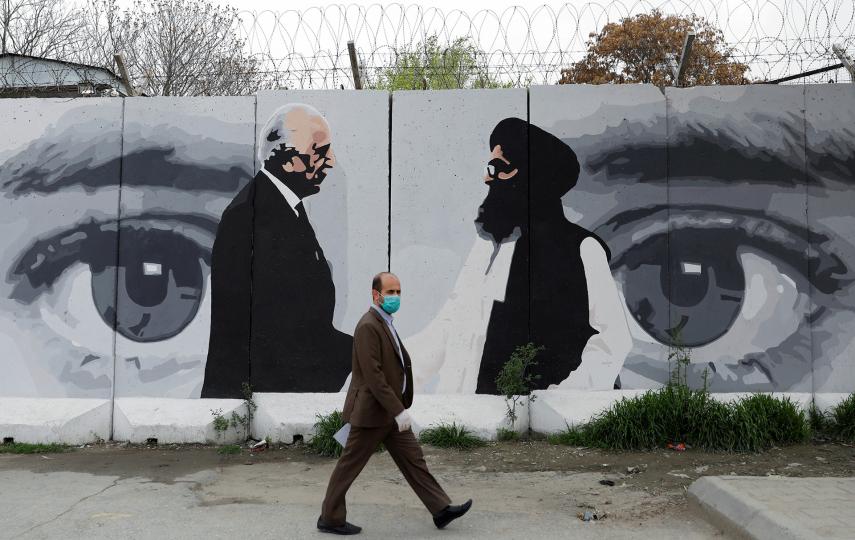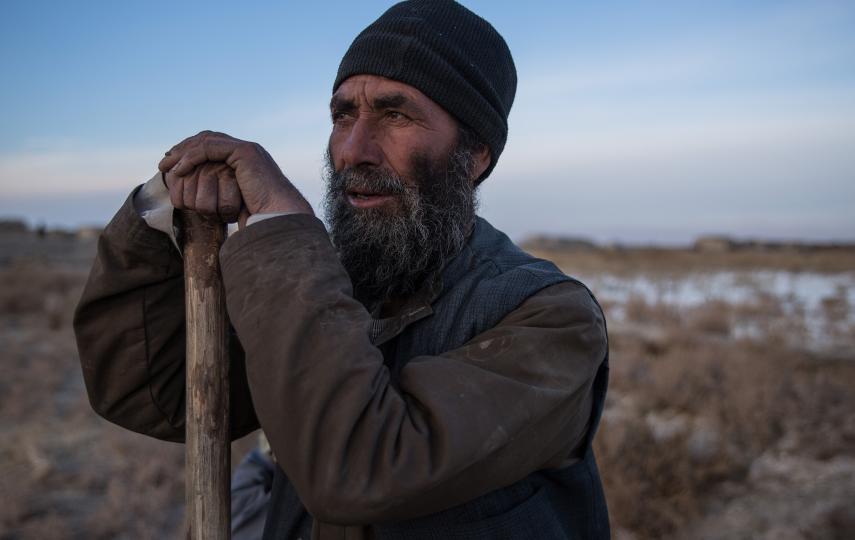Fatima lay in bed at the internal medicine ward at the bustling Mirwais Hospital in the southern Afghan city of Kandahar – a black scarf draped over her head and body hiding the drip going into her arm.
Early that morning, Fatima had ingested rat poison in an attempt to end her life.
“She drank some water with the rat killer,” said Amina*, her mother-in-law, seated at the bedside holding Fatima’s hand. “She suddenly fell down and we were all crying. I begged her, ‘Why are you doing this?’”
Doctors say this scene has become all too common – especially during the coronavirus pandemic.
“We have so many poisoning patients,” said Doctor Nasima Hakimi, head of the hospital’s Family Protection Centre, which helps women facing violence.
COVID-19 has taken a devastating toll on Afghanistan’s economy, driving mass job losses, shrinking household incomes, and sending food prices skyrocketing. Experts say the knock-on effects of the pandemic are increasing gender-based violence – and pushing more women like Fatima to attempt suicide.
“In internal medicine units across the country, most women are using poison because of [gender-based] violence. Poison is in every home – you can find it everywhere. They use this way to end their problems,” Hakimi said.
Definitive statistics aren’t available. But at this hospital alone, doctors estimate there was one attempted suicide case every other day as coronavirus infections escalated in May and June. The real figure is likely to be far higher, as many women do not make it to the hospital.
Almost 90 percent of Afghan women have experienced at least one form of physical, sexual, or psychological violence in their lifetime.
“Poisoning has increased due to COVID-19 because women’s husbands are always at home, and they are fighting with one another, and children are not going to school,” Hakimi said. “The main cause of gender-based violence is joblessness.”
With hunger and humanitarian needs expected to soar during the coming winter months – two in every five Afghans may face crisis or emergency levels of food insecurity in 2021, according to UN estimates – doctors like Hakimi fear more women may attempt suicide as the pressures grow.
Violence rises
COVID-19 has fuelled a spike in gender-based violence across the world, as well as in crisis zones, aid groups say. The pandemic has exacerbated existing gender inequalities and economic stress, while lockdowns have left women trapped in their homes with their abusers, cut off from services like counselling and safe shelters.
The pandemic has also exposed the shortcomings of efforts to prevent and respond to gender-based violence, which in turn can lead to suicide when women feel they have no options left.
Violence against women and girls was already a pervasive problem in Afghanistan before the coronavirus: Almost 90 percent of Afghan women have experienced at least one form of physical, sexual, or psychological violence in their lifetime, the World Health Organization says.
“The fundamental driver is deep, deep, deep gender inequality.”
The Afghan Independent Human Rights Commission estimates that about 3,000 Afghans attempt to take their own life each year. Suicide is far more common among men in most of the world, but in Afghanistan the opposite is true: 80 percent of suicide attempts are by women, according to the rights commission.
National data on suicides is unreliable because so many go unreported and there’s no uniform tracking system. But deep-seated inequality and pervasive violence against women in Afghanistan suggest first-hand accounts of rising suicide numbers, like those from doctors at the Kandahar hospital, are signs of a growing problem, said Heather Barr, interim co-director of the women’s rights division at Human Rights Watch.
“GBV is such a serious problem there, and there are so few resources,” said Barr, who was previously based in Afghanistan. “The fundamental driver is deep, deep, deep gender inequality.”
COVID-19 and suicide: The global picture
Early on in the pandemic, studies modelling the effect of COVID-19 on suicide rates predicted an increase ranging from one to 145 percent.
The global situation today is unclear, particularly in lower-income countries where resources and data may be more scarce. For example, police data from Nepal points to a rise in suicides; figures from Peru suggest the opposite.
“Prevention must be prioritised while we wait for a clearer picture,” stated an editorial published in the BMJ medical journal in November.
When the pandemic hit, experts knew GBV would likely rise due to the severe economic pressures on Afghans.
These pressures – combined with spiralling conflict, disasters, and displacement in large swathes of the country – have propelled more people into poverty. COVID-19 could help push Afghanistan’s poverty rate from about 54 percent to 72 percent, the World Bank projects, while 17 percent of households have taken on “catastrophic” levels of debt, according to the UN.
Before the pandemic, female suicide attempts were almost always related to domestic violence, Barr said. During the pandemic, they’re predominantly driven by “the economic downturn, not the lockdown”. In other words, it is not simply the fact that women have been confined to their homes more than usual that has led to the spike, but rather the larger economic crisis.
“The economy was already disastrous; now it is further collapsing,” she said.
Shohra Qaderi, a health researcher in the northern city of Mazar-i-Sharif, said gender-based violence has worsened due to “financial problems caused by the COVID-19 pandemic”.
“Men are the main breadwinners and controllers of families… the pandemic forced many men to be unable to provide the basic needs, and this issue caused in-family fighting and an increase in violence against women,” Qaderi said. “Meeting the needs of the family is a male’s responsibility. It is an obligation and mandatory in Islam and when they cannot do this, the only way to quench their anger or to empty themselves is to start punishing children and women, from verbal to physical harassment.”
Few safe spaces for women
Part of the problem reaching women in crisis is a widespread lack of protection and a shortage of services for women fleeing violence, advocates say. Afghanistan’s few safe houses or women’s shelters are concentrated in the capital, Kabul. There are none in Kandahar, and the concept of a woman leaving her husband is rare and highly stigmatised, on top of the fear of revenge attacks.
“There are basically no shelters in the southern half of the country and there are no national hotlines,” Barr said. “The idea that a woman would call the police is pretty unthinkable… the police do a better job of entrenching gender norms than they do arresting people who are engaged in violence against women.”
Afghanistan’s justice system is failing women and girls, the UN’s Afghanistan mission warned in a December report, which found only half of reported crimes of violence against women and girls reached the court system.
Between September 2018 and February 2020, researchers documented 40 cases of women forced to commit suicide because of gender-based violence. Many of the women had tried, but failed, to get help from their families or communities.
“It is clear that many women feel they have no viable option to escape violence other than by extreme acts of self-harm or suicide,” stated the report, which also warned of rising violence during the pandemic.
Afghanistan criminalised domestic abuse in 2009 with its Law on the Elimination of Violence Against Women. But Human Rights Watch’s Barr said the legislation has “never really been implemented”.
“Donors have tried all these different things, from prosecution units to funding special police units, but nothing has really worked, because fundamentally the political will at the top isn’t there, and the acceptance at the level of each judge and officer isn’t there either,” she said.
This means that the services available to women affected by gender-based violence are largely confined to counselling clinics at local hospitals like Mirwais in Kandahar.
The hospital’s Family Protection Centre, headed by Hakimi, is a rare safe haven for women facing violence. Its small, two-room office is situated in a discrete area where few men walk the corridors. The centre has 25 staff who work across different health facilities in Kandahar to identify women who need help beyond medical care.
Hakimi estimates some 25 women come to the centre each day. “We don’t tell anyone that they come, and we want to keep it that way,” she said.
The centre provides counselling to women experiencing GBV and also connects them to legal services.
“The idea that a woman would call the police is pretty unthinkable… the police do a better job of entrenching gender norms than they do arresting people who are engaged in violence against women.”
Staff aim to prevent future violence, and subsequent suicide attempts, by resolving family feuds and engaging with men and extended families, if permitted.
While Hakimi says they’ve been able to resolve many disputes via counselling, she admits the centre is limited in what it can do.
With the impact of COVID-19 to be felt for years to come, and levels of GBV remaining shockingly high, Hakimi is worried for the future.
The country is gearing up for a harsh winter season, and the government and UN are warning of a second wave of coronavirus infections. Afghanistan has recorded roughly 50,000 cases, but inadequate testing and healthcare access – worsened by the ongoing conflict – masks the real disease burden.
For now, Hakimi is focused on supporting her patients, including Fatima – the woman who tried to take her own life.
“This is not physical violence or sexual violence; it is psychological violence,” Hakimi said, gesturing toward Fatima, who lay on the hospital bed, occasionally wincing in pain.
“When she’s stable, we will take her to our office, or we can send the counsellor here,” she said. “We want to try and prevent this from happening again. This is something that becomes habitual. It happens again and again.”
As Fatima rested, Hakimi pulled aside the woman’s mother-in-law, Amina.
“We need to solve this problem,” she said. “Consult with us time by time; maybe you can come with her to counselling. We can help her together. We can prevent this from happening again.”
Amina nodded repeatedly, sobbing as the doctor spoke.
“Tell her she’s a good woman,” Hakimi said, “that she’s very important in your family and that she has three children to live for.”
* Fatima and Amina are pseudonyms used to protect their identities.
sc/il/ag
Befrienders Worldwide provides confidential support to people in emotional crisis or distress: https://help.befrienders.org/
The UK’s Royal College of Psychiatrists has mental health information in multiple languages, including Pashto (پښتو) and Farsi (فارسی).
The Transcultural Mental Health Centre in Australia’s New South Wales has mental health resources in multiple languages, including information in Farsi (فارسی).





